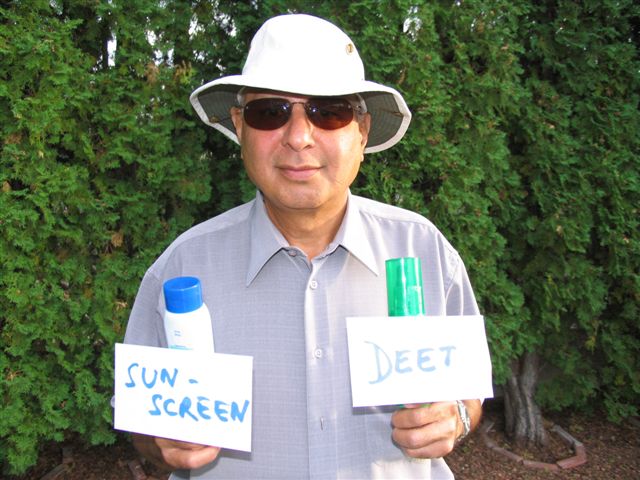Dear Dr. B: The mosquito season is going to be here soon. How can I control mosquitoes around my home and how can I protect myself?
Answer: At this time of the year, it is quite appropriate to worry about mosquitoes. Mosquitoes carry many diseases worldwide. In North America, the real concern is the role of mosquitoes in spreading the West Nile disease. West Nile virus is carried by birds. Mosquitoes get infected by feeding on the blood of these birds. Infected mosquitoes then transmit the virus to humans when they bite us.
All mosquitoes need water to develop from their immature stages to adulthood. The life cycle takes less than 10 days to complete if the surrounding temperature is favorable. Once the adult mosquito is ready to fly then it looks for something to eat.
Nectar from flowers provides energy to both male and female mosquitoes. While male mosquitoes feed exclusively on nectar, the female mosquito needs blood to produce her eggs. The source of blood can be animals (including people) and birds.
According to Health Canada website, the female mosquito may live for as long as three weeks during the summer, and any female that lives long enough to feed on blood more than once has the potential to transmit blood-borne diseases from one animal or person to another. Although most mosquito species breed in clean water in the wild, many of the species that breed near your home tolerate polluted water. Most of the 75 mosquito species found in Canada survive the winter as dormant fertilized eggs.
The Health Canada website has many helpful suggestions on how to protect your home and yourself from mosquitoes. I will summarize that information here.
Certain species of mosquitoes breed around the home in containers like bird baths and eavestroughs. It is important to control the breeding sites around your home by preventing stagnation of water (flower pots, gardening cans, wheelbarrows, puddles, tire swings) even in small quantities. Boats and gardening containers can be stored upside down.
Cover any garbage, recycling or composting containers, to prevent water from accumulating in them. Empty your rain barrel if the water is more than a week old. Keep your swimming pool aerated, cleaned and chlorinated, even if it is not being used. Dump any water that collects on your swimming pool cover. For more ideas visit http://www.pmra-arla.gc.ca/english/consum/mosquitos-e.html
How to protect yourself?
During mosquito season (May to September for most of Canada), you should limit your outdoor activities between dusk and dawn, when mosquitoes are the most active. Minimize exposure of your skin by wearing long pants, long sleeves, socks and shoes when outdoors. Loose clothings will keep mosquitoes away from the skin. Use personal insect repellents. Very useful information on this subject is available in Health Canada’s fact sheet, Safety Tips on Using Personal Insect Repellents found at www.westnilevirus.gc.ca.
DEET-based repellents (considered to be most effective) at various concentrations offer different protection times. For example: 30 per cent concentration will provide six hours of protection compared to five per cent concentration which provides only two hours of protection from mosquito bite. Read the directions carefully before using DEET-based repellents especially in children and infants.
Enjoy your summer but dont forget the sun screen and insect repellent.
Start reading the preview of my book A Doctor's Journey for free on Amazon. Available on Kindle for $2.99!
